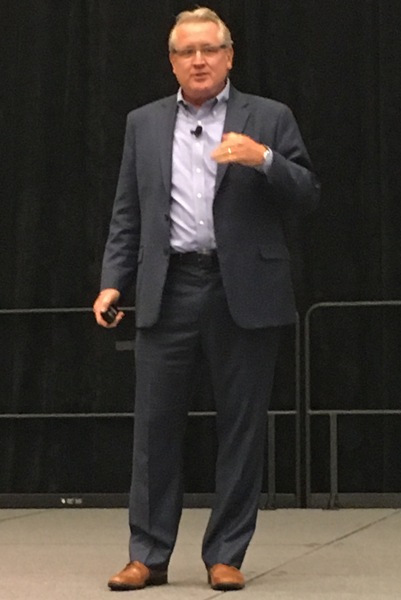In 1991, the music industry went through a major rebellion. In the late 1980s, “hair metal” bands like Bon Jovi, Poison, Warrant and Ratt ruled the radio and MTV. The more success they found, the more new bands copied their sounds and looks. But, the music got worse and the looks and gimmicks got more ridiculous. The public got fed up with this bloated music scene, and it all came crashing down. With the release of Nirvana’s “Smells Like Teen Spirit,” fans seemed to switch their alliances overnight. Gone were the “hair metal” bands and in came grunge bands. The songs were simpler and stripped-down and focused on the realities of what the bands were feeling. Kids better related to the songs as they described what they were going through in their lives.
The signs were there for the “hair metal” bands. The copycat bands focused more on the flash and fashion that had helped make the earlier bands successful. They stopped paying attention to changing musical tastes and the integrity of the music. That’s what really drove the musical revolution. There’s a similar trend now in marketing. We’re creating copycat content and force-feeding it to customers instead of focusing on their needs. We’re hitting the same tipping point as the “hair metal” bands. Marketing consultant, speaker and author, Mark Schaefer is seeing the shift and discusses it in his book, “Marketing Rebellion: The Most Human Company Wins.” This post examines the book and a Content Marketing World book club discussion with Schaefer.
The End of Control
How did we get to the point of a marketing rebellion? We continue to do the things our customers hate. People don’t want to see ads. With radio, people change the channel during commercials. People either change TV channels or fast forward through commercials. With computers, people install pop-up and ad blockers. Some even pay for ad-free tiers of streaming music. So what do we do as marketers? We spend more time trying to get past the technology to force people to see our ads than trying to actually help them.
Why is it so hard for us to listen to our customers and stop doing the things they hate? According to Schaefer, one reason is that we have comfort in being able to measure these tactics. When metrics show declining performance, we tend to tweak the program rather than make real improvements. Bigger changes take us into the unknown and could lead to tactics that aren’t as measurable. We have to learn to be comfortable with this.
Along with measuring, these tactics feel more tangible. We can show an ad we created and have the feeling that we did something. The creation becomes the end goal rather than the means of reaching the actual business goal we’re working towards (paraphrased from Doug Kessler’s Content Marketing World 2019 presentation).
Ultimately, marketers have lost control. The book points to a McKinsey report (from 2009!) that shows “two-thirds of the touchpoints during the evaluation phase of a purchase involve human-driven marketing activities like internet reviews, social media conversations, and word-of-mouth recommendations from friends, family, and online experts.” Only one-third of the marketing they pay attention to comes from us. Customers are now in control. What does that mean for marketers? We must be more human.
Marketers Are Lost

As marketers, we’re paying close attention to the changes in marketing trends and tools, but we’re missing the customer evolution. Our perception of what we think is effective vs. what customers are experiencing is way off. Customer loyalty barely exists and trust in brands is at an all-time low.
Five factors are contributing to marketing rebellion:
- Crushing Technological Change: The pace of change and the amount of data are overwhelming. We constantly feel behind.
- Over-reliance on Technology and Automation: We’re losing track that our customers are humans and not data points. With more technology and tools, we opt for better efficiency over better experience.
- Organizational Paralysis: Companies continue to do things that are no longer working. Like above, instead of making changes, we tweak programs and budgets. We don’t stop to look at what’s changing and how we need to adapt to these changes.
- The Comfort of Measurement: We need to move away from metrics that we know we can get and experiment in areas where the metrics may be less clear.
- Tech is Changing Consumer Behavior Rapidly: As technology is changing how we market, it’s also changing our customers’ behaviors. Hyper-empowered customers are less loyal, more informed and less trusting of customers. What worked in marketing 10 years ago, won’t always work now.
Given these conditions, how can marketers continue to be effective? How can we make any type of long term plans if everything is going to change so quickly? The book points to Jeff Bezo’s approach with Amazon. Instead of worrying about what’s going to change in the next 10 years, he focuses on what’s NOT going to change. They build their business strategy around the things that will be stable over time. In Amazon’s case, they know customers will always want low prices, fast delivery and a wide selection. These are the human needs they build around. They develop the strategy and create or use the technology and tools that help them deliver. They don’t build a strategy based on using tools. Focusing on being human and relating to humans will make companies more successful.
The Most Human Companies Wins
Let’s be clear here. Marketing technology is not causing issues. Technology is a great thing when it can remove friction and barriers with our customers. Misusing technology is the issue. Here are ways in which we misuse technology to disrespect customers:
- The Cycle of Annoyance: Downloading content doesn’t mean a customer wants a windfall of emails. How many times have you received an email, or worse, a phone call minutes after filling out a form?
- Because You Can Doesn’t Mean You Should: Don’t put tactics in place based on what statistics tell you works instead of what we know customers want. For example, we’ve all heard that the data says pop-ups are effective. But even if you’re getting a 6% click rate, you’re still annoying 94% of your website visitors.
- Technology Is Not the “Easy Button”: Online conversations are ok, but can’t replace face to face. Face to face still provides tidbits of info that you’d never get through online surveys and chats. Go on sales visits. Take part in sales calls. What can you learn from tech support calls and field visits?
- The Uninvited Guest: These are the programmatic ads, spammy emails, robocalls and other interruptions that customers hate.
How do we keep from losing the human touch? According to Schaefer, “Great marketing builds an emotional connection to customers in some way…when we become obsessed with technology, we lose focus on emotion…If you’re not in the business of creating emotion, you’re not in marketing, you’re in sales. You’re just trying to move merchandise.”
I Love the Hands that Made It
“I love the hands that made it” may be the most memorable quote and story from Marketing Rebellion. It typifies how some brands will be able to be successful. In this example, Schaefer explains that a friend had a stack of handcrafted soaps. She explained she didn’t necessarily love the brand but loved the hands that made it. She knew the story of the local soap company and its founders. Like her, the owners want to make the world a nicer place to live. She believes in their mission and wants to support them.
How can other brands exemplify this type of humanity? One way is to be fans of your fans and make them the hero of your stories. That means understanding who your fans are and what’s important to them. How do their values align with your brand? How can you make them feel good by buying your products? These are the types of customers that are happy to tell your story to everyone they know.
Risks and Pitfalls
Becoming a more human company is not easy, especially for well-established companies. According to Schaefer, companies need to distinguish between what they “think” it means to be human and what it actually means. Are they practicing what they preach? While authenticity is important, many customers would settle for companies just being honest. Shaefer explains that being human must be in the company’s DNA. If it’s not, customers may not believe it. Or, worse, that can cause a backlash or breach of trust that can take years to fix.
Where does that leave brands that have questionable pasts or have never shown a human side? Shaefer isn’t sure if they can make a pivot to be more human. At the very least, it will take a lot of time and, in some cases, a culture change within the company. But, it may be worth the effort if it’s something they believe.
Marketing Rebellion offers more details with more examples of how marketing is shifting. Shaefer provides a thought-provoking approach for you to examine your marketing to be more human and effective. It’s had the most impact on my marketing over the last year and I can’t recommend it enough.
Thanks for reading and please share your comments below. I’d love to hear your thoughts on Marketing Rebellion.
